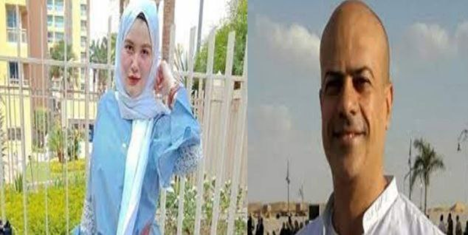
The retrial of an Egyptian TikTok female influencer, Haneen Hossam, has ended in a three-year prison sentence and a fine of two hundred thousand pounds (approximately $10,750) , based on bogus human trafficking charges, for a video she posted on TikTok. Meanwhile, the Public Prosecution has denied any criminal suspicion in economic researcher Ayman Hadhoud’s suspicious death.
An Egyptian court on Monday sentenced Haneen Hossam, a well-known TikTok female influencer, to three years in prison after her retrial conviction for human trafficking in a case that involved girls introducing artistic performances in videos on TikTok.
The TikTok star was arrested alongside fellow influencer Mowada al-Adham in April 2020 after she encouraged her followers to broadcast their own videos online. She was handed a two-year sentence for “violating family values and principles” in July 2020 but acquitted on appeal before prosecutors introduced the more serious charge of human trafficking.
She was then sentenced in absentia to 10 years in prison last June, and her retrial—to which she was entitled in light of her previous conviction being in absentia—has now resulted in a three-year sentence instead.
The case of the social media influencer Haneen Hossam was seen by critics as part of a crackdown on self expression by government officials in conservative Egypt.
However, prosecutors had accused her of promoting human trafficking by allegedly exploiting minor girls to gain material benefits with dance videos. It wasn’t clear how the videos were related to human trafficking.
Hossam, in her early 20s, had been sentenced to 10 years in prison but a Cairo Criminal Court judge Monday reduced it to three years. She was also fined 200,000 Egyptian pounds ($10,800).
Monday’s ruling is final and can’t be appealed.
The charges partly stemmed from Hossam’s invitation to girls to join another social media platform, Likee, claiming they could generate more money from their videos.
Hossam and other women, including TikTok influencer Mawada Eladhm, were first sentenced in July 2020 to two years in prison on convictions for “violating the values and principles of the Egyptian family,” inciting debauchery and promoting human trafficking.
An appeals court overturned the sentences and both women were released.
But prosecutors appealed the decision and accused them of human trafficking. The Cairo Criminal Court subsequently sentenced Hossam in June to 10 years in prison while Eladhm got a six-year-sentence.
Hossam appealed that ruling and she was retried by a different judge, who on Monday reduced her sentence to three years.
Hossam and Eladhm vaulted to TikTok fame in recent years, amassing millions of followers for their video snippets set to catchy Egyptian club-pop tracks.
In their respective 15-second clips, the women wear makeup, pose in cars, dance in kitchens and joke in skits — familiar and seemingly tame content for the platform.
Mai El-Sadany, the managing director and legal and judicial director of the Tahrir Institute for Middle East Policy, wrote in response to the sentencing, “For the Egyptian state to instrumentalize ‘human trafficking’ charges to exert control over the expression and socioeconomic mobility of young women is deeply disturbing.”
“There are real and serious cases of human trafficking that must be prosecuted—these TikTok cases are not it,” El-Sadany added.
Hadhoud’s suspicious death
In another context, the Public Prosecution also announced Moday that its investigation into the death of economic researcher Ayman Hadhoud found no evidence of criminal conduct.
Prosecutors claim that Hadhoud’s autopsy report confirmed that he died as a result of a chronic heart condition and that his body showed no traces of injuries from “criminal violence or resistance.” Hadhoud’s family and lawyers have said they saw evidence of beatings and torture on his body, a conclusion backed up by independent forensic experts who examined photos of his corpse.
Human rights organizations have pushed for a thorough, transparent, and independent investigation into Hadhoud’s disappearance and death, but the prosecutors’ statement instead repeats their pre-autopsy claims without further evidence. They also urged people not to buy into the “rumors and false news” about his case, which unnamed forces are supposedly sharing in order to “disturb public security and peace.”
Authorities have still yet to explain why more than one month passed between the date they say Hadhoud died and when they finally informed his family of his fate, nor why they initially attempted to have him buried anonymously. They have also avoided questions about why they continuously denied holding Hadhoud in state custody when asked by his family, both before and after his death.
Sources from the psychiatric hospital where Hadhoud was being held, meanwhile, have shared details of his shocking lack of medical care in the days leading up to his death.



